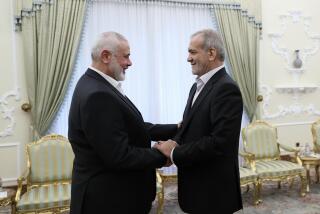Spy flap weakens Iranian President Mahmoud Ahmadinejad
- Share via
Reporting from Beirut — Electronic surveillance of officials at the highest levels of political power lies at the heart of a rift between Iranian President Mahmoud Ahmadinejad and supreme leader Ayatollah Ali Khamenei, a source close to Tehran’s conservative leadership told The Times.
Intense mistrust of Ahmadinejad’s closest aide, Esfandiar Rahim Mashaei, put him in the sights of the nation’s spy services, the source said, triggering a sequence of events that has humiliated and weakened Ahmadinejad after Khamenei reversed a presidential decision to fire the nation’s intelligence minister, Heydar Moslehi.
On Sunday, after word of Ahmadinejad’s continued absence from Cabinet meetings began making international headlines, the president resumed participating in state affairs to halt speculation about any breach between him and Khamenei. “The relationship between the supreme leader and the president is that of a father and a son,” Ahmadinejad was quoted as saying by the semiofficial Fars News Agency.
But the hostility among Iran’s various political factions and the intense jostling among its officials have been anything but filial.
Rivals of Ahmadinejad clearly smell blood and have spoken out against him and launched an impeachment drive in parliament. Iranian authorities have begun censoring pro-Ahmadinejad news websites that have been covering the affair, probably because of the sensitive accusations of espionage and leaks at the highest levels of the country’s political elite.
Though the events do not threaten the stability of the Islamic Republic, they underscore both the infighting that has bedeviled Iran since its 1979 revolution brought a hodgepodge of Shiite clerics and fellow Islamists to power. They also highlight Khamenei’s role as the nation’s ultimate spiritual, political and military leader.
Ahmadinejad, whose disputed 2009 reelection prompted massive street protests, has struggled hard to gain more control over the country’s national security branches, purging the Intelligence Ministry of those he mistrusted in the first weeks after the election unrest and replacing the foreign minister late last year.
But his ambitions have often been thwarted by Khamenei and those loyal to him.
“All achievements and accomplishments of the revolution are under the auspices of his eminence” Khamenei, Friday prayer leader Ahmad Khatami told worshipers in Tehran last week. “It is not true that the supreme leader has kept away from the fray. His eminence is busy monitoring everything.”
The flap over the intelligence minister also illustrates the tangled ties that bind Iran’s political and security establishment.
The source, an official in the conservative Islamic Coalition Party, said the president decided to fire Moslehi after being told that both Intelligence Ministry and Revolutionary Guard spies were eavesdropping on Mashaei, Ahmadinejad’s in-law and right-hand man, who is mistrusted by hard-liners and right-wing clergy. Many believe Ahmadinejad is positioning Mashaei as his successor after his term ends in 2013.
“Top intelligence commanders of the Revolutionary Guard and Heydar Moslehi bugged the office of Mashaei — as they must — and monitored his private and public political behavior,” said the official, who spoke on condition of anonymity because of the sensitivity of the topic.
Mashaei, himself a former Intelligence Ministry official, discovered the electronic surveillance with the help of the ministry’s No. 2, Hassan Abdollahian, the source said. Moslehi fired Abdollahian after discovering his role in divulging sensitive information to the presidential office.
Told of the surveillance and the firing of Mashaei’s confidant, Ahmadinejad on April 17 ordered Moslehi to hand in his resignation, appointing Abdollahian to replace him.
But Khamenei quickly rejected the Cabinet change. Though ministers formally answer to Ahmadinejad, it is widely understood that national security appointments and demotions must be vetted by Khamenei.
“Putting Mashaei and his cronies under surveillance was also likely under the auspices of the supreme leader,” said the source, whose party has long been suspicious of Ahmadinejad and his loyalists for their rabble-rousing populism and questioning of the clergy’s authority.
The conflict over the intelligence minister has further frayed relations within the country’s conservative political scene ahead of 2012 parliamentary elections. “The problem is that the [conservatives] are unprecedentedly divided,” said an analyst who spoke on condition of anonymity. “The system is not monolithic.”
Many conservatives have urged Ahmadinejad to unify the right wing by ditching his divisive in-law, a move he has resisted. Analysts say Ahmadinejad believes Mashaei has been instrumental in formulating a political message that may appeal beyond the president’s conservative and rural base to the middle classes he alienated in the 2009 election. At the same time, Mashaei has alienated hard-liners with talk of placing Iranian values above Islamic principles, sympathy for Israelis and frequent trips abroad as an unofficial emissary of Ahmadinejad.
“No need to tie heaven to earth to justify the presence of Esfandiar Rahim Mashaei in the presidential office,” said an editorial in the daily newspaper Kayhan. “Simply sack him. Get rid of him, and no more criticism.”
Special correspondent Ramin Mostaghim in Tehran contributed to this report.
More to Read
Sign up for Essential California
The most important California stories and recommendations in your inbox every morning.
You may occasionally receive promotional content from the Los Angeles Times.













